How to Change Oil in Pressure Washer Pump
Do you even need to change your pressure washer's pump oil?
95% of pressure washers under $400 have a pump you never do any maintenance on.
If it breaks – you just replace – and it's usually covered under warranty.
These residential-use wobble and axial piston pumps are filled with oil at the factory and permanently sealed before they leave. There is no way to easily change the oil, even if you wanted to.
So how do you know if your power washer water pump needs an oil change?
Two ways:
- You can find the info in your User Manual. If the pump requires oil changes your manual will tell you.
- There will be a way to change the oil without tearing the pump down – the pump assembly will have a drain and fill plug/bolt.
But since you're here: I'm guessingyou already know your pressure washer water pump oil needs changing…
…You're in the right place because this definitive guide has everything you need to know to change the pump oil (today) even if you've never done it before.
7 Little Known Facts About Changing Pressure Washer Pump Oil
Everything you need to know about pump oil and changing it is broken down into 7 sections below.
You can jump to each section here:
- Why a pump needs oil
- Pump oil vs. engine oil
- Pump oil brands and types
- How to know when to change it out
- Tools & equipment you need
- Steps how to change it
- Where to get rid of the old stuff
1. Why a pump needs oil.
A pump needs oil to lubricate its internal surfaces to reduce friction, wear and heating of the parts as they move. The purpose is to prevent early failure.
Lubrication type is as important to the system as material type, or bearing type.
Oil is critical for pump performance:
Did you know lubrication oil is 1-of-9 pillars of mechanical element design?
The other 8 are:
- Fasteners
- Permanent joints
- Springs
- Rolling contact/journal bearings
- Spur/helical/bevel/worm gears
- Clutches/brakes/flywheels
- Belts/chains/ropes
- Shafts/axles
Knowing which type of lubrication oil to use in a mechanical system is a solid 2 weeks of lectures in 3rd year engineering classes (and that's just an intro). The same amount of time is spent on gears, axles and welding design.
So what are the reasons you should care about pump oil?
These 3 reasons:
To maximize component life
Acts as lubrication for moving parts reducing friction between them. This reduces heat. Excess heat is a problem because it expands the seals making them at risk for cracking.
Warranty requirements
Check your User Manual to see if your warranty is void if you fail to perform the regular maintenance. It is easy to see dirty unchanged oil when you take it in for warranty repairs.
Cost to rebuild pump back from failure is expensive (if possible)
- Axial pressure washer pumps –Might not be worth repairing depending on the failure. If all that's gone wrong is a dirty unloader valve then you can teardown the pump and clean or replace it. That repair is no problem. If you have cracked or damaged seals or o-rings, then you have an affordable repair. But if you need to start replacing pistons or the swashplate you will be better off just replacing the entire pump.
- Triplex water pumps –Almost always worth it to rebuild as a new (good) triplex pump can cost $500+ and the individual components likely to fail are easy to access and replace.
2. Difference between oil used in pumps and engines.
The difference is the additives added to give the oil certain properties. Common additive difference between pump and regular motor oil will be:
- Magnesium sulfonate is used as a detergent additive for motor oil.
- Silicone compounds like PDMS are used as an anti-foaming agent for pump oil.
Let's find out the reason for these differences.
Non detergent pump oil vs detergent small engine oil
A modern engine uses detergent oil because it has an oil filter. The detergent oil cleans the contaminants off the surfaces of the engine and the oil filter filters them to keep them out of the bearings. Using detergent oil without the oil filter will mean the contaminates build up and the oil will get dirty fast… And you'll need to change the oil frequently to prevent excess wear and potential failures.
A pump doesn't have an oil filter. That's why it is recommended to use non-detergent oil in pressure cleaner pumps. If you use detergent oil in a pump, all the contaminates it cleans off the surfaces will be flowing through the oil. This increases the risk of wear inside the pump.
Anti foaming and anti aeration additives
Controlling air in oil is done with anti foaming and anti aeration additives. Of the two anti aeration is more important.
All pump and pump oil system will contain air – the reason air can be a problem in oil is when the following occur:
- Aeration: it causes air bubbles that can lead to pump cavitation (unwanted chattering/vibration of the pump moving parts) and loss of oil viscosity (not lubricating properly because too much air).
- Foaming: not usually a big issue… But because foam sits at the top of the oil surface it can foam-over causing extra pressure/leaks of the oil and why not just reduce the foam with a simple additive?
3. All the pump oil types, how they are labelled, the brands most people use and the best pump oil to buy.
The water pump will use a type of motor oil for lubrication. It will have additional additives and there are easy ways to spot which oil can be used for pumps (even if they aren't labelled as pump oil).
It will have a 'ND' designation:
ND stands for non-detergent.
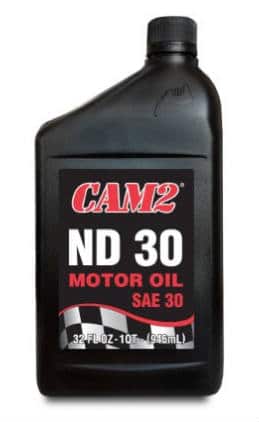
Check out the best pump oil on Amazon here…
It will say non-detergent right on it:
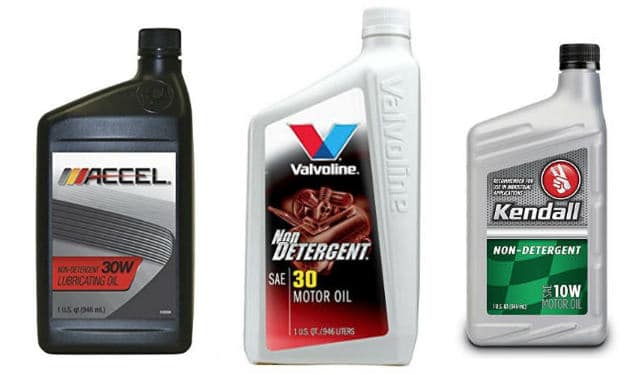
Check out the best pump oil on Amazon here…
It will say pump oil:
There are many brands to choose from:
- Mi-T-M
- CAT Pumps
- Briggs and Stratton
- BE
- Simpson
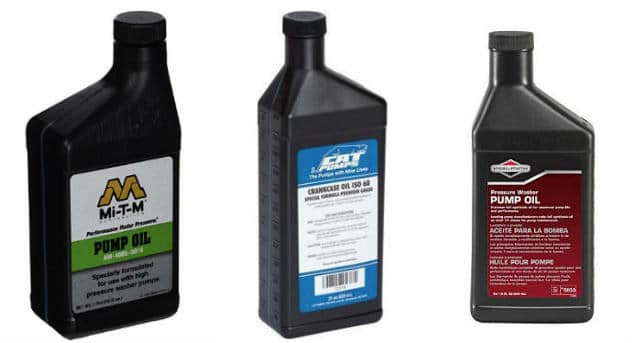
Check out the best pump oil on Amazon here…
It will be labelled for classic cars or early (1920s) model engines:
Classic cars built in the early 1900s didn't have oil filters (oil filters were invented in 1923) and so they used low or no detergent motor oil. This is the ideal type of oil for pumps. However, today, the lubricant companies are able to charge a premium by designating it for classic cars – it is often much more expensive than the above non detergent oil options.
Check out the best pump oil on Amazon here…
What do all the designations – SAE 30, 15W 40 mean?
When oil gets hot it gets thinner – it flows easier.
Here's an analogy:
Think of butter.
When butter is room temperature it barely flows onto bread. Then you heat it up and it easily flows.
This property is called viscosity – it is a liquids resistance to flow.
- High viscosity is high resistance to flow – like molasses in January, peanut butter, ketchup, syrup, molten glass or lard.
- Low viscosity means the liquid flows easily – like water.
SAE 10 has less viscosity (flows easier) than SAE 40 at the same temperature.
If the oil has a designation 15W 40 it is a multi viscosity oil. The 15W means it performs like SAE15 oil at low temperatures (in winter). And performs as if it's a SAE 40 at higher/operating temperatures.
If you live in Florida, you'll probably not require a multi viscosity oil because it doesn't get cold enough.
4. How to know when your pressure washer pump needs an oil change (if ever).
Most residential pressure washer pumps will not require any maintenance. Your User Manual will tell you.
If a pump failure occurs within the warranty period, they will replace the pump instead of repairing it. However, many pressure washers on the market have pumps that do require regular oil change even if the manual doesn't say so. And troubleshooting if a pump needs an oil change may also be required.
Here are 5 different power washer water pumps.
Pump on Stanley machine allows easy access to change pump oil.
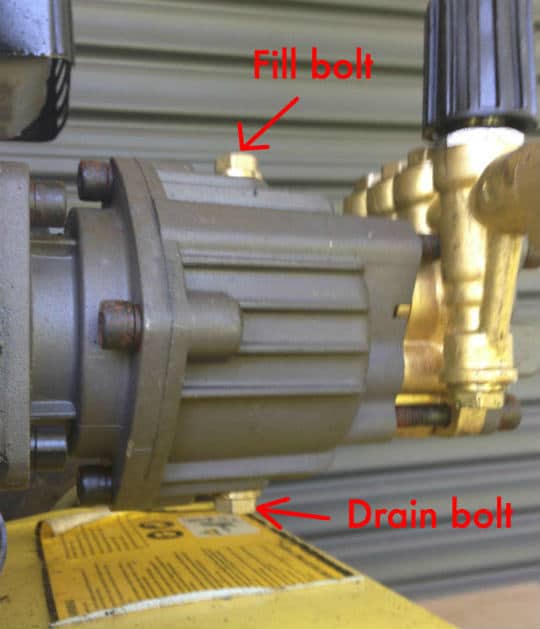
This AR Blue Clean electric pressure washer's pump does not give access (without full pump teardown).
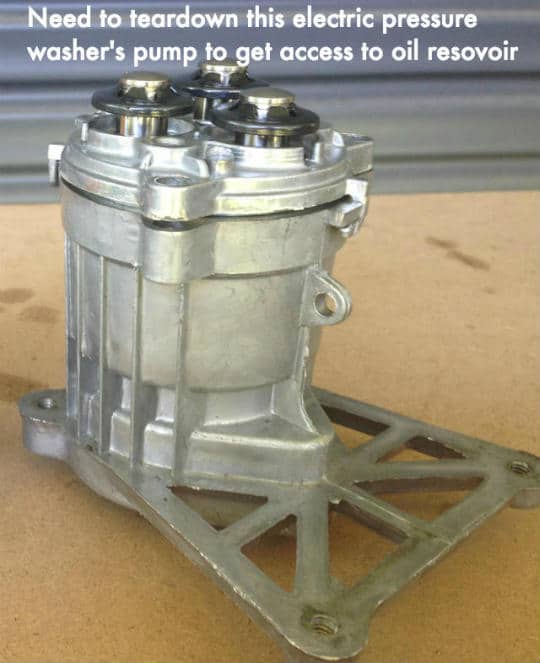
This pump has single access despite the manual saying no oil change required ever.
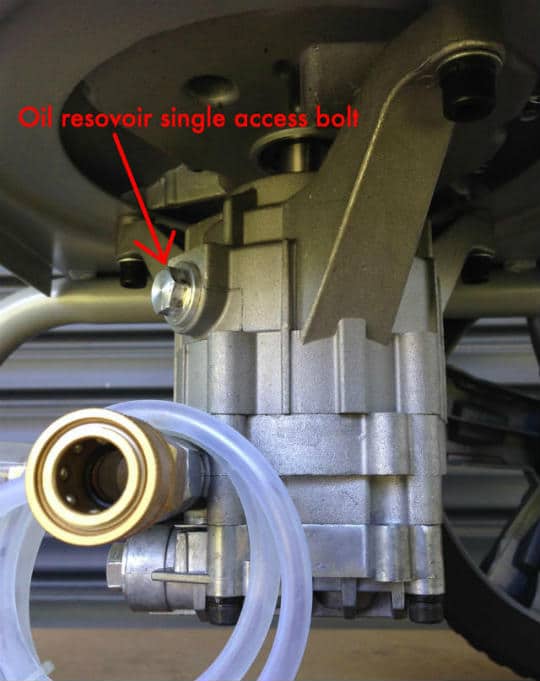
This gas pressure washer pump has no access and tells you in the manual the pump is zero maintenance.
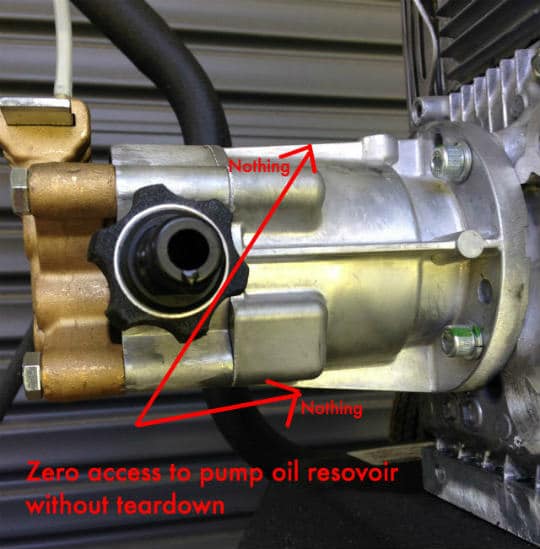
Despite this Briggs and Stratton pressure cleaner having a pump with oil reservoir access it says in the manual warranty will be void if maintenance performed on pump.

Let's say you have a pump that can have the oil easily changed…
How do you know WHEN to change water pump oil?
Regular maintenance warranty consideration
First off, it's always a good bet to keep track how many hours you have used your machine.
Why?
Because often-time your User Manual will specify an oil change based on hours used.
Oil leaking
If you notice a regular oil leak from the pump then you can be sure it is low on oil and will need to be repaired or replaced – and oil added often if you must use it before the repair.
Oil milky color
To notice the oil is milky color you would have to either notice a leak, teardown the pump for a different repair or drain a tiny amount out to check for quality. In any of these situations it is safe bet to change oil.
5. The tools and equipment needed to change out the water pump's oil (in your garage or shed) today.
You need very little tools and equipment to change your power washer's water pump oil:
- Oil catch – Something to catch the oil as it exits the pump casing. You can use an aluminium BBQ tray like I did or an actual oil pan.
- Wrench – If your machine's pump assembly has bolt access then you'll need the correct size wrench. Many pressure washers have a plastic knob for access not needing a wrench.
- Funnel – To avoid spilling pump oil use a funnel to refill the pump assembly with oil.
- Oil storage container – I use a modified 2 litre soda bottle to store the oil until I recycle it at the mechanics down the road. Or you can use the funnel and empty it back into an old oil bottle.
6. How to change the pump oil.
Watch me change the water pump oil on a Stanley 2,500 PSI pressure washer:
I bought this used power washer a few months ago… Holy molly it had some dirty pump oil.
8 Steps to Change Power Washer Water Pump Oil:
- Loosen and remove pump oil reservoir top access bolt to relieve pressure inside
- Place oil catch under pump's oil drain bolt and grab correct size wrench
- Loosen and remove pump oil reservoir drain bolt and let oil spill into catch container
- Put dirty oil catch container aside and put drain bolt back in place
- Open non-detergent pump oil and grab your funnel (or not) and pour oil into pump.
- You don't want to fill reservoir of oil completely… Only around 3/4 full.
- Place fill bolt back onto pump and tighten.
- Clean up the area and fire up your pressure washer.
7. Where to safely get rid of the drained pump oil.
There are two options for getting rid of the pump oil: recycle or dispose. If you do research you will find free options near you. Some other places may require a small fee of a few dollars per litre.
Why reuse or recycle the used pump oil?
Pump or motor oil can be reused once it is cleaned/re-refined so it makes since to return it to a oil recycler near you.
Where to recycle near you?
These places will accept your used oil:
- Local car mechanics shop
- Wal-mart, Home Depot, Costco
- Jiffy Lube (or similar)
- Local recycling center
Where to dispose of old pump oil if you can't find a recycler?
Most local dumps will accept used motor oil. Be sure to check your local dump website or call them before driving there.
Sources
- Parts Breakdown PDF. www.ARNorthAmerica.com.
- Early Engine Oil – Detergent vs. Non-Detergent. www.FillingStation.com.
- PDMS Applications. Wikipedia.org.
- Oil additives. Wikipedia.org.
- Controlling Oil Aeration and Foam. www.MachineryLubrication.com.
- Managing, Reusing, and Recycling Used Oil. www.EPA.gov.
Jamey
Jamey is the founder of Pressurewashr.com and has led testing and reviewing since 2013. He has also worked as a commercial pressure washer at a rendering plant for 3 years and has been using commercial and residential pressure washers for 15+ years. He is also a mechanical engineer and while working in the mining industry designed several turn-key light industrial vehicle wash pads.
How to Change Oil in Pressure Washer Pump
Source: https://pressurewashr.com/pressure-washer-water-pump-oil-change/